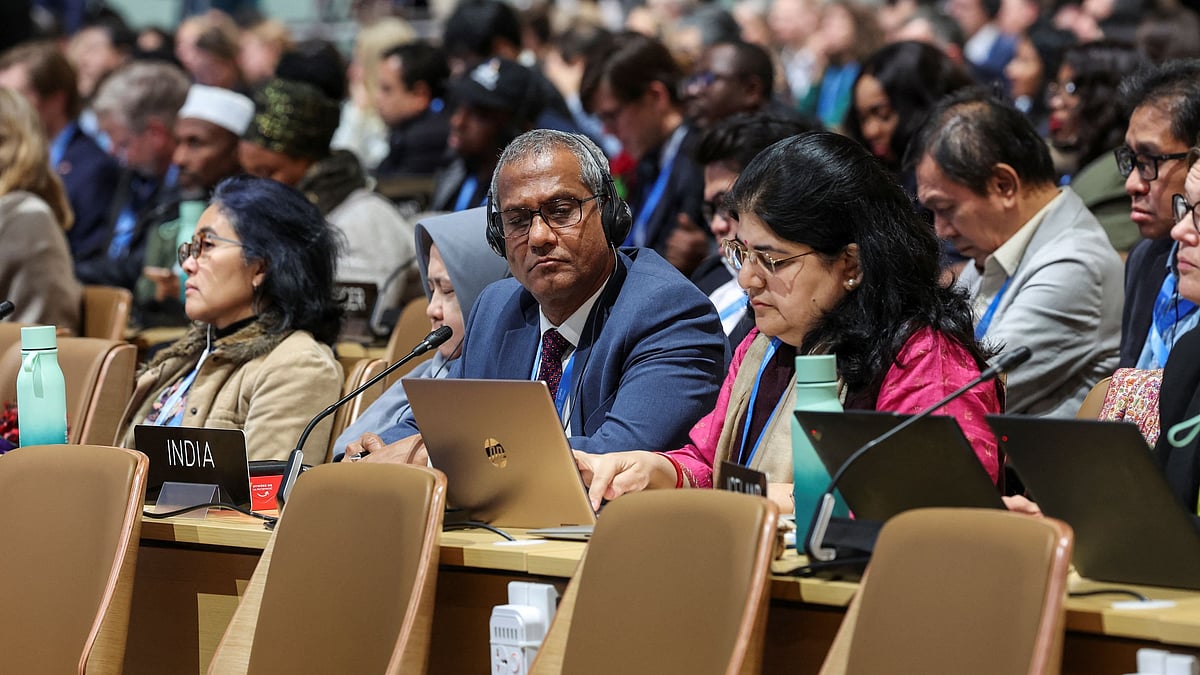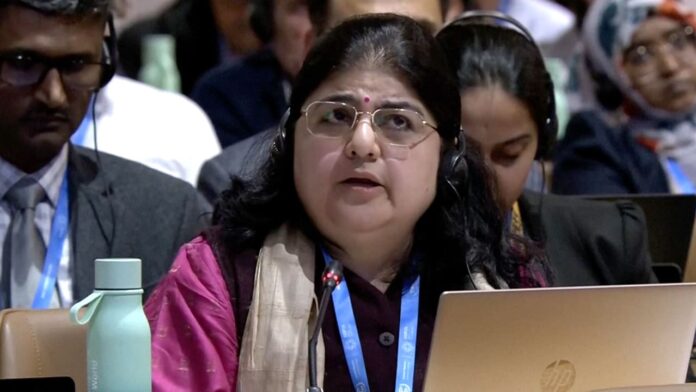In a strong stance at the United Nations COP29 climate summit in Baku, Azerbaijan, India rejected the adoption of a $300 billion climate finance package for the Global South, calling it insufficient and misaligned with the principles of equity and Common but Differentiated Responsibilities (CBDR). The Indian delegation expressed deep disappointment with both the process and the outcome of the agreement, which was adopted without allowing India’s input beforehand.
India’s Sharp Rebuke at the Closing Plenary
Chandni Raina, the Indian delegation’s representative and adviser from the Department of Economic Affairs, did not hold back in criticizing the financial package. Speaking during the closing plenary session, Raina described the deal as “nothing more than an optical illusion” that fails to address the scale of the climate crisis faced by developing nations.
“We are disappointed in the outcome, which clearly highlights the unwillingness of developed countries to fulfill their historical responsibilities,” Raina stated. She emphasized that the $300 billion allocation falls significantly short of the financial requirements needed to mitigate the effects of climate change in vulnerable nations.
The Indian negotiator also raised concerns about the procedural flaws during the adoption process. “The delegation was not allowed to speak before the adoption of this agenda,” she noted, adding that this exclusion undermined the principles of fair negotiation.

Key Objections Raised by India
India’s rejection of the climate finance package centered around two major issues: the inadequacy of the financial commitment and the breach of established principles of climate justice. Raina argued that the $300 billion pledge is insufficient to meet the needs and priorities of developing countries, which bear the brunt of climate change despite contributing minimally to its causes.
“This document is incompatible with the principle of CBDR and equity,” Raina declared, reiterating India’s longstanding position that developed countries, as historical emitters, must shoulder greater responsibility in addressing the climate crisis.
India also criticized the developed nations for failing to fulfill their previous commitments, including the long-standing promise of $100 billion annually to developing countries. This new agreement, Raina asserted, does little to inspire confidence that wealthier nations are willing to meaningfully support the Global South.
Global South Nations Rally Behind India
India’s objections found resonance among other developing countries, with Nigeria, Malawi, and Bolivia voicing their support. Nigeria’s representative called the $300 billion package a “joke,” underscoring the shared frustration among developing nations over the perceived lack of commitment from wealthier countries.
Malawi and Bolivia also criticized the financial deal, highlighting the gap between promises made at global climate forums and their actual implementation. These nations joined India in calling for a more equitable approach to climate finance that adequately addresses the needs of the most vulnerable populations.
The $300 Billion Deal: Too Little, Too Late?
The $300 billion climate finance package, adopted at COP29, aims to support mitigation and adaptation efforts in developing countries. However, critics argue that the amount is grossly inadequate given the escalating costs of addressing climate change impacts in these regions.
Experts estimate that trillions of dollars will be needed annually by 2030 to help developing nations transition to low-carbon economies, build climate-resilient infrastructure, and recover from climate-induced disasters. The $300 billion figure, spread over several years, pales in comparison to these requirements, further fueling discontent among nations like India.
India’s critique also draws attention to the broader issue of climate justice. Developing nations argue that financial commitments must account for historical emissions by developed countries, which have disproportionately contributed to global warming. Without meaningful action from wealthier nations, achieving the goals of the Paris Agreement remains a distant prospect.
Procedural Concerns and Lack of Transparency
India’s frustration also stemmed from the procedural handling of the agreement’s adoption. The delegation objected to being denied an opportunity to present its views before the package was finalized. “We are very unhappy and disappointed with the process,” Raina remarked, adding that such practices erode trust in global climate negotiations.
This procedural criticism echoes longstanding grievances by developing countries, which often feel sidelined in international climate forums dominated by developed nations. India’s stance at COP29 underscores the need for more inclusive and transparent negotiations to foster mutual trust and accountability.
Call for Stronger Commitments
India’s objections at COP29 highlight the persistent divide between developed and developing nations in addressing the climate crisis. While the $300 billion deal marks a step forward, its inadequacy and the lack of inclusivity in its adoption have raised serious questions about the global commitment to equitable climate action.
As the world grapples with worsening climate impacts, India’s call for stronger financial commitments and adherence to CBDR principles serves as a reminder that achieving climate justice requires more than symbolic gestures. The success of future climate negotiations will depend on bridging this divide and ensuring that the voices of the Global South are not just heard but acted upon.

